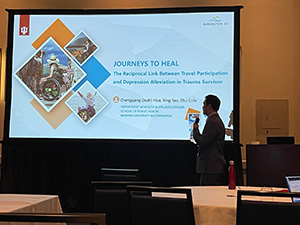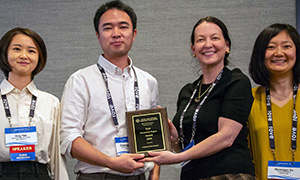Doctoral students Chenggang Hua and Xing Yao in the Department of Health & Wellness Design are spearheading an emerging research trend studying the therapeutic effects of travel participation on alleviating depression in trauma survivors.
Hua and Yao were awarded the Best Research Paper Award at the Travel and Tourism Research Association (TTRA) Annual International Conference held earlier this summer. The paper, entitled “Journeys to Heal: The Reciprocal Link Between Travel Participation and Depression Alleviation in Trauma Survivors,” is putting Hua and Yao—with the support of faculty members Shu Cole, Ph.D. and Evan Jordan, Ph.D.—at the forefront of this traditionally under-researched area of public health.
"Travel can go beyond enjoyment or just leisure. It involves a lot of stakeholders, especially for people with mental health issues," shares Hua. "They need to negotiate with their families, service providers…it is a lot of work to do. But during this intervention comes a training process to help [trauma survivors] integrate back into society; conquer their fear; gain confidence; trust people."
According to Hua and Yao, the study utilized a “random intercept cross-lagged panel model on a group of 2,440 participants with a longitudinal dataset spanning 20 years” and found evidence linking increased travel activities with significantly reduced depressive symptoms. When carefully implemented, acknowledging the therapeutic effects of travel could foster a vital relationship between health professionals and tourism and hospitality professionals.
Last December, Yao was recognized at the American Public Health Association (APHA) for her research on "gender disparities in housework-related stress during travel". For instance, hotel rooms as opposed to an Airbnb or Vrbo home lack domestic appliances and a higher level of housework industrialization, creating the impression of more "gender neutral" environments.
"In combination with a leisure-focused setting, these spaces may help reduce gender-related health disparities between women and men," says Yao. "The positive experiences of travel are something that can be taken back to daily life to improve upon it, and even impact gender relationships. We are a very small team studying this topic, but this award gives us further confidence to continue our work."

Hua points out a specific challenge common to the tourism and hospitality industry: Hotels will invest in handicapped accessible rooms, but not extend such accessibility to the recreational areas. Hua cites the "standardized service" model in the hospitality and tourism area is fraught with health disparities, often designed for the "abled" customer. Accommodation services attempt to fill in the gap for people with disabilities when the standardized model fails to meet their needs, and Hua cites this as the fundamental flaw in the current industry service protocols. Improving the service design would offer significant health and wellness benefits across the board, according to Hua and Yao.
"Then there are invisible disabilities, such as mental health issues, that providers are not prepared to accommodate," says Hua. "Another is groups with obesity issues—airplane seats are designed for 'normal-sized' people and thus, they cannot travel smoothly… given that travel is a basic human need with a broad range of participants, there is a lot that needs to be done in terms of public health in the hospitality and tourism area."
Dr. Jordan applauds Yao and Hua, stating that this international recognition solidifies the importance of this area of research to the travel and tourism industry.
"Chenggang and Xing are really at the vanguard of this nascent area of research in seeking to understand the relationships between travel and health, and the disparities within those relationships among populations that have been traditionally marginalized," he says.
For more stories about SPH-B students and faculty making a big difference both locally and worldwide, visit go.iu.edu/48bx.


